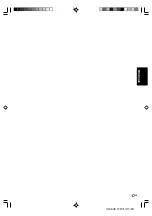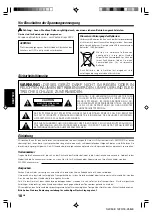
ENGLISH
3
EN
SW-508 1223/02-0
9
/EN
Caution: Read this page carefully to ensure safe operation.
IMPORTANT SAFEGUARDS
10. Lightning
–
For added protection for this appliance during
a lightning storm, or when it is left unattended and unused for
long periods of time, unplug it from the wall outlet and disconnect
the antenna or cable system. This will prevent damage to the
appliance due to lightning and power-line surges.
11. Abnormal smell
– If an abnormal smell or smoke is
detected, immediately turn the power OFF and unplug the
appliance from the wall outlet. Contact your dealer or nearest
service center.
12. Damage requiring service
– The appliance should be
serviced by qualified service personnel when:
A.
The power-supply cord or the plug has been damaged.
B.
Objects have fallen, or liquid has been spilled into the
appliance.
C.
The appliance has been exposed to rain or water.
D.
The appliance does not appear to operate normally by
following the instruction manual. Adjust only those controls
that are covered by the instruction manual as an improper
adjustment of other controls may result in damage and will
often require extensive work by a qualified technician to restore
the appliance to its normal operation.
E.
The appliance has been dropped, or the enclosure damaged.
F.
The appliance exhibits a marked change in performance.
13. Servicing
– The user should not attempt to service the
appliance beyond that described in the instruction manual. All
other servicing should be referred to qualified service personnel.
14. Power lines
– An outside antenna system should not be
located in the vicinity of overhead power lines or other electric
light or power circuits, or where it can fall into such power lines
or circuits. When installing an outside antenna system, extreme
care should be taken to keep from touching such power lines
or circuits as contact with them might be fatal.
15. AC outlets
– Do not connect other audio equipment with
a power consumption larger than that specified to the AC outlet
on the rear panel. Never connect other electrical appliances,
such as an iron or toaster, to it to prevent fire or electric shock.
16. Overloading
– Do not overload wall outlets, extension
cords, or integral convenience receptacles as this can result in
a risk of fire or electric shock.
17. Attachment
– Do not use attachments not recommended
by the appliance manufacturer as they may cause hazards.
18. Replacement parts
– When replacement parts are required,
be sure the service technician has used replacement parts
specified by the manufacturer or have the same characteristics
as the original parts. Unauthorized substitutions may result in
fire, electric shock, or other hazards.
19. Safety check
– Upon completion of any service or repairs
to this appliance, ask the service technician to perform safety
checks to determine that the appliance is in proper operating
condition.
Please read all of the safety and operating instructions before
operating this appliance. Adhere to all warnings on the appliance
and in the instruction manual. Follow all the safety and operating
instructions. These safety and operating instructions should be
retained for future reference.
1.
Power sources
– The appliance should be connected to a
power supply only of the type described in the instruction
manual or as marked on the appliance. If you are not sure of the
type of power supply to your home, consult your appliance
dealer or local power company. For appliances intended to
operate from battery power, or other sources, refer to the
instruction manual.
2.
Power-cord protection
– Power-supply cords should be
routed so that they are not likely to be walked on or pinched by
items placed upon or against them, pay particular attention to
cords at plugs, convenience receptacles, and the point where
they exit from the appliance.
3.
Ventilation
– Slots and openings in the cabinet are provided
for ventilation and to ensure reliable operation of the appliance
and to protect it from overheating, and these openings must
not be blocked or covered. The appliance should be situated so
that its location or position does not interfere with its proper
ventilation. To maintain good ventilation, do not put records or
a table-cloth on the appliance. Place the appliance at least 10 cm
away from the walls. Do not use the appliance on a bed, sofa,
rug or similar surface that may block the ventilation openings.
This appliance should not be placed in a built-in installation such
as a bookcase or rack unless proper ventilation is provided or
the manufacturer’s instructions have been adhered to.
4.
Water and moisture
– The appliance shall not be exposed
to dripping and splashing - for example, near a bathtub,
washbowl, kitchen sink, laundry tub, in a wet basement, or near
a swimming pool, etc. Do not place an object containing liquid,
such as a flower vase, on the appliance.
5.
Temperature
– The appliance may not function properly if
used at extremely low, or freezing temperatures. The ideal
ambient temperature is above +5°C (41°F).
6.
Heat
– The appliance should be situated away from heat
sources such as radiators, heat registers, stoves, or other
appliances (including amplifiers) that produce heat. Do not
place a flaming object, such as a candle or lantern, on or near
the appliance.
7.
Electric shock
– Care should be taken so that objects do
not fall and liquid is not spilled into the enclosure through
openings. If a metal objects, such as a hair pin or a needle,
comes into contact with the inside of this appliance, a dangerous
electric shock may result. For families with children, never
permit children to put anything, especially metal, inside this
appliance.
8.
Enclosure removal
– Never remove the enclosure. If the
internal parts are touched accidentally, a serious electric shock
might occur.
9.
Cleaning
– Unplug this appliance from the wall outlet
before cleaning. Do not use volatile solvents such as alcohol,
paint thinner, gasoline, or benzine, etc. to clean the cabinet.
Use a clean dry cloth.




































